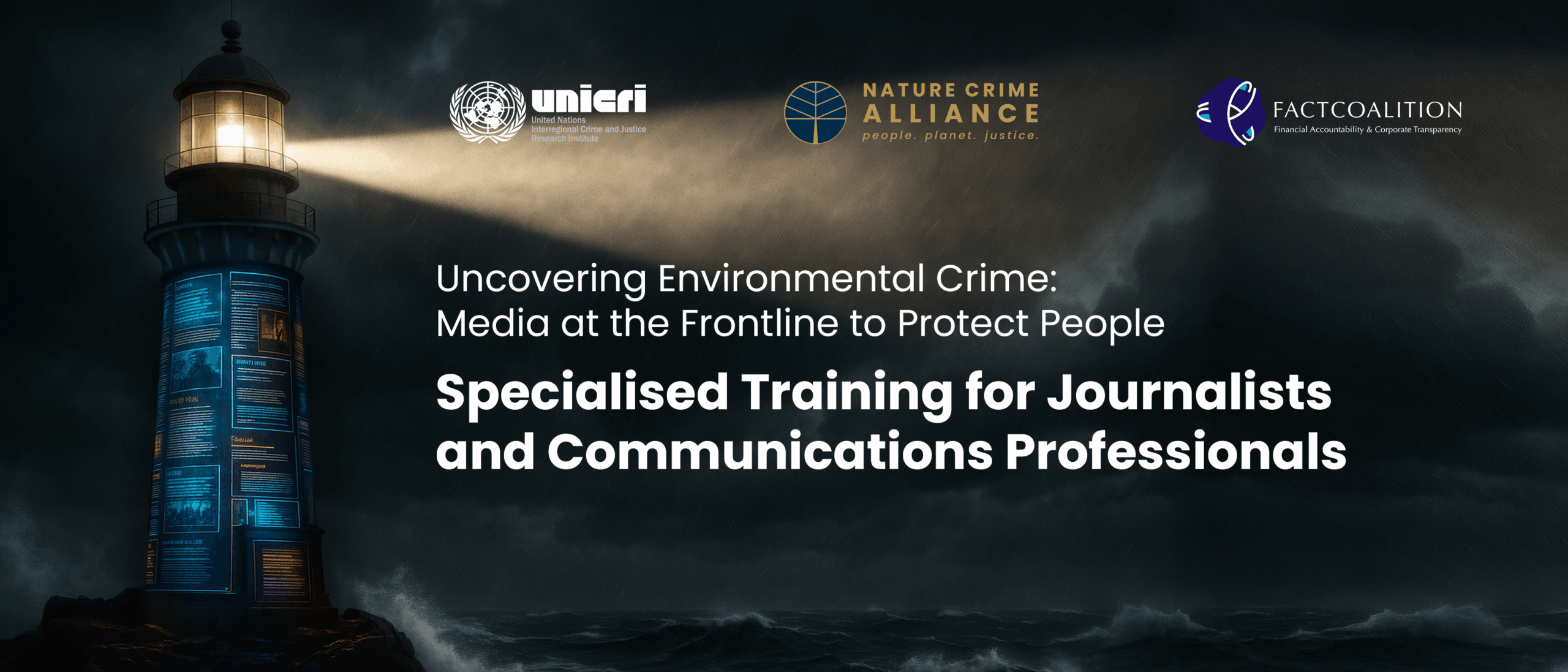Alliance members deliver environmental crime trainings for journalists and media professionals

More than 100 journalists and communications professionals took part in a training course on environmental crime convened in partnership between the Nature Crime Alliance and its members the UN Interregional Crime and Justice Research Institute (UNICRI) and the FACT Coalition.
‘Uncovering Environmental Crimes: Specialised Trainings for Journalists and Communications Professionals’ aimed to provide practical insights into tools and approaches drawn from intelligence analysis, financial journalism, and conservation criminology.
Five members of the Alliance – UNICRI, FACT Coalition, WWF-UK, Earth League International, and World Resources Institute (WRI) – delivered training sessions, alongside experts from across journalism, academia and civil society.
Empowering media professionals to transform evidence into impact
The activity builds on UNICRI’s previous work supporting journalism on environmental crime, and aligns with the Nature Crime Alliance’s Strategic Communications priority area.
Marina Mazzini, Public Information Officer at UNICRI, who played a key role in convening the course, commented: “The trainings reflected UNICRI’s commitment to strengthening investigative capacities and fostering collaboration between journalists, civil society, and law enforcement to address crimes that affect the environment.
“Partnerships like this with the Nature Crime Alliance are essential to bridging the gap between data, policy, and public awareness.”
A wide-ranging curriculum
Day one, moderated by Paul Radu, Co-Founder and Head of Innovation at the Organised Crime and Corruption Reporting Project (OCCRP), featured opening remarks from Leif Villadsen, Acting Director of UNICRI, Julia Yansura, Environmental Crime and Illicit Finance Program Director, FACT Coalition, and Andrew Marshall, Chief Communications Officer, WRI.
The course kicked off with Dr Louise Shelley, Professor Emerita, George Mason University, providing an overview of environmental crimes and how they operate, before Julia Yansura from the FACT Coalition shared insights on the financial aspects of these crimes. John Dodsworth, Drivers Initiative Lead at WWF-UK, then introduced participants to the ‘Environmental Crimes Financial Toolkit’, which enables finance professionals, civil society actors and journalists to identify illegality risk.
The second day, moderated by Matthew Burnett-Stuart, Programme Officer, UNICRI, explored scientific and investigative techniques and approaches to environmental crime journalism, with Dr Meredith Gore, Professor and Research Director, University of Maryland, discussing ways to measure environmental crime and David Taylor, Adjunct Professor, Science Writing Program, Johns Hopkins University, exploring science-based storytelling.
Participants also heard insights from Emily Fishbein, a Network Fellow at the Pulitzer Center Rainforest Investigations Network, who shared learnings from her work reporting on illegal mining in Myanmar, and Andrea Crosta, Founder of Earth League International, who highlighted the importance of crime convergence while sharing tips on investigative approaches. Flaviano Bianchini, Founder and Director, Source International, closed day two with practical examples on how scientific data can be collected and used to support journalism.
The final day, moderated by Luke Foddy, Communications Manager, Nature Crime Alliance, introduced participants to the challenges of transboundary investigations during a session with Bruce Ohr, Executive Director of the International Wildlife Trust. Another key challenge facing journalists and communicators in the environmental space – disinformation – was addressed by Francesco Marelli and Katy Carroll, both from UNICRI’s CBRN Programme.
Day three concluded with presentations on satellite monitoring tools and their use for investigative journalism, with Ruth Nogueron, Senior Associate at WRI, demonstrating the value of the Global Forest Watch platform and Michela Corvino, Earth Observation Security Applications Engineer at the European Space Agency, highlighting the potential of Earth Observation technologies to support journalists’ work.
A multi-sector approach
Feedback from participants has been extremely positive, and future training courses are already under discussion, subject to funding. The range of expertise from different sectors was highlighted as a strength by participants, who noted that the mix of expert voices kept the sessions engaging.
Participants described the training as “really impressive”, highlighting the relevance of the content and the quality of the lecturers. One participant commented: “The training was great overall; the lecturers and the content were really impressive.”
Another emphasised the practical value of the sessions focused on financial investigation, noting: “The tools to ‘follow the money’ were really useful, especially seeing how organised crime groups and different types of transactions may be related.”
Luke Foddy, Communications Manager, Nature Crime Alliance, WRI, commented: “The Nature Crime Alliance was established to bring actors from different sectors together to share expertise and bolster collective efforts to fight environmental crime.
“These trainings, which fall under the Alliance’s Strategic Communications priority area, are an excellent example of this multi sector collaboration, and we are immensely grateful to UNICRI and the FACT Coalition for developing this course with us, and to our other partners who contributed to the sessions.”
Find out more about the Nature Crime Alliance’s Strategic Communications work

